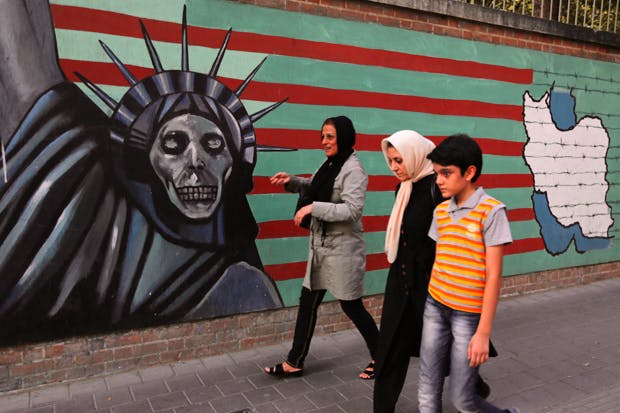Iran is, beyond doubt, a sponsor of terrorism and this week it has been made much stronger. It has (again) agreed not to make a nuclear bomb and in return trade sanctions are being dropped — so money will start to flow in once more. We can be sure that the cash will soon find its way to Hezbollah in Syria, and to what remains of Bashar al-Assad’s regime. A stronger Iran means a longer and bloodier Syrian civil war, a more vulnerable Israel and a further injection of money and arms into the world’s deadliest war zones. None of this is in doubt.
The question is whether, after this week’s deal, Iran will be less likely to menace the region as a nuclear power. The ayatollahs have allowed inspectors in, and agreed to the quick return of sanctions if they go back on their word. But Iranians are past masters at playing the West for fools, and capitalising on the great desire of Washington to believe that a historic breakthrough is possible; that a fanatical regime dedicated to Israel’s destruction can be tamed; that it will prefer an enriched economy to enriched uranium.
It’s possible that if sanctions had been left in place they might have toppled this regime in the end — just as the Soviet Union crumbled when its economy began to stagnate. But the experience of North Korea suggests that there is no clear relationship between prosperity and nuclear weapons. Crackpot regimes can usually find the money for nukes, especially if they consider them to be their best chance of survival. Keeping Iran under the acute pain of sanctions would not have precluded its becoming the world’s tenth nuclear power.
The hope is that an invitation to resume trading with the rest of the world may now provide Iran with a firm incentive to reform. The deal may bolster the position of Tehran’s moderates — including its president, Hassan Rouhani. Much has changed in the region, as Ahmed Rashid describes on page 14. It may well be that, for a whole range of reasons, Iran will decide that being able to trade with the world (and the wealth that comes from that) is preferable to being able to terrify the world.
But history suggests that Iran’s leaders cannot really be trusted. They have a record of reneging on agreements — and pursued a secret uranium-enrichment programme for nearly two decades while supposedly refraining from it under the terms of the Nuclear Non-Proliferation Treaty. In theory, it should become increasingly difficult for Iran to hide weapons development, with teams of inspectors demanding the right to go where they wish. In practice, it all depends on whether the inspectors are allowed to. If the regime does start to interfere with them, how quickly will sanctions reapply? What if it takes months, or years, for the so-called ‘snapback’ sanctions to kick in? We just don’t know.
What we do know is that Iran has agreed to relinquish 98 per cent of its stock of enriched uranium, and two thirds of its centrifuges. It would have been better if it had given up all its nuclear devices, but it’s a good start. And the experience of Iraq does show that an inspections regime can work. Saddam Hussein, it turned out, had indeed destroyed his weapons of mass destruction. His co-operation with weapons inspectors was genuine, rather than a cover for clandestine activities. He liked to pretend otherwise, to make his regime seem stronger than it was.
At least on this occasion no one can say of western policy that it is dictated only by our insatiable demand for Middle Eastern oil. With the US now the world’s largest oil producer, the importance of Middle Eastern reserves to western economies has dwindled. If anything, US oil interests would have been better served by a continuation of sanctions against Iran, the lifting of which threatens to dump even more oil on an already saturated international market.
Iran now has the upper hand. It knows that it has just brokered a deal with a war-weary West, and with a Russia that wants to drop the whole idea of action being taken against unsavoury regimes. Barack Obama is keen to be remembered as the president who brokered peace with Iran as well as with Cuba. Notwithstanding George Osborne’s commitment to maintaining Britain’s military spending above 2 per cent of economic output, Britain has neither the capacity nor the stomach for yet more action in the Middle East. Everyone Iran has been dealing with desperately wants the agreement to work. Israel looks on appalled; at this rate, Saudi Arabia may end up being its best ally.
So there is no point in celebrating the Iran deal this week, or hailing it as historic. It does not represent the end of the cold war with Iran; it simply establishes a position from which the cold war with Iran may one day be concluded. At best, it may prove a model for dealing with rogue regimes that have nuclear ambitions. At worst, we will be back to where we were before Tuesday: with sanctions re-imposed on an uncooperative Iranian regime. But one that will have been made richer by a few years’ relief from the sanctions that had worked so effectively.
On balance, this is a gamble worth taking — but only if immediate penalties are applied should Iran start to back away from the promises it has just made. The most important stage in this long game is only just beginning.
Got something to add? Join the discussion and comment below.
Get 10 issues for just $10
Subscribe to The Spectator Australia today for the next 10 magazine issues, plus full online access, for just $10.














Comments
Don't miss out
Join the conversation with other Spectator Australia readers. Subscribe to leave a comment.
SUBSCRIBEAlready a subscriber? Log in